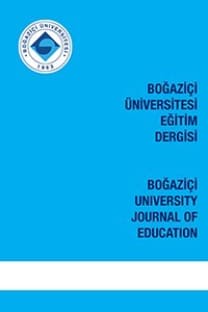Early Childhood Education and Special Education: Establishing and Strengthening Common Bonds for Inclusion
Öz
The issue of inclusion has generated much attention and dialogue for both early childhood and special education educators. The fact remains that common ground needs to be established and strengthened so that early childhood and special education teachers work collaboratively to promote the welfare and teaching of all children This article provides a general overview of issues of early childhood inclusion in the US and explores several options that enable early childhood educators and special educators to work collaboratively together.
Anahtar Kelimeler:
Inclusion, early childhood education, , special education
___
- Bergen, D. (1993). Teaching strategies: Facilitating friendship development in inclusion classrooms. Childhood Education, 69, 234-236. Bergen, D. (1994). Teaching strategies: Developing the art and science of team teaching. Childhood Education, 70,300-301. Bergen, D. (1997). Perspectives on inclusion in early childhood education. In J.P. Isenberg and M.R. Jalongo (Ed.), Major trends and issues in early childhood education: Challenges: controversies, and insights (pp. 151 - 171). New York, NY: Teachers College Press. Branscombe, N.A. (2000). Early childhood education: A constructivist perspective. Boston, MA: Houghton Mifflin. Bredekamp, S., & Copple, C. (Eds.). (1997). Developmentally appropriate practice in early childhood programs. Washington. DC: National Association for the Education of Young Children. Bricker, D. D. (2000). Inclusion: How the scene has changed. Topics in Early Childhood Special Education, 20, 14-19. Carta, J. J., Atwater, J. B., Schwartz, I. S., & McConnell, S. R. (1993). A reaction to Jonshon and McChesney Johnson. Topics in Early Childhood Special Education, 13, 243-254. Cook, E., Klein, M. D., Tessier, A. (2004). Adapting childhood curricula for children in inclusive settings. Upper Saddle River, NJ: Merrill Prentice Hall. Dickman, G.E. (1994). Inclusion: A storm sometimes brings relief Perspectives, 20, 3-6. Gartner, A., & Lipsky, D.K. (1987). Beyond special education: Toward a quality system for all students. Harvard Educational Review, 57, 367-395. Hom, E., Lieber, J., Sandall, S., Schwarz, I., & Li, S. (2000). Supporting young children’s IEP goals in inclusive settings through embedded learning opportunities. Topics in Early Childhood Special Education. 20, 208-223. Lewis, RB, & Doorlag, DH (2003). Teaching special students in general education classrooms (6 th ed.). Upper Saddle River, NJ: Merrill. Lipsky, D. K. & Gartner, A. (2001). Education Reform and Early Childhood Inclusion. In M. J. Guralnick (Eds.), In Early Childhood Inclusion: Focus on change (pp. 39-49). Baltimore, MY: Paul H. Brookes. Mastropieri, M. A. & Scruggs, T. E. (2004). The inclusive classroom: Strategies for effective instruction. Upper River, NJ: Pearson Education. Mather, N., & Roberts, R. (1994, Fall). The return of students with learning disabilities to regular classrooms. Perspectives on Inclusion, 6-12. Perske, R. (1988). Circles of friends. Nashville, TN: Abingdon Press. Rose, D. F. & Smith, B. J. (1993). Preschool mainstreaming: Attitude barriers and strategies for addressing them. Young Children, 48, 59-62. Shapiro, J.P., Loeb, P., & Bowermaster, D. (1993, December 13). Separate and unequal. U.S. News and World Report, 46-60. Shonkoff, J. P., & Phillips, D. A. (2000). From neurons to neighborhoods: The science of early childhood development. Washington, D.C.: National Academy Press. Smith, D. D. (2001). Introduction to special education: Teaching in an age of opportunity. Needham Heights, MA: Allyn and Bacon. Trawick-Smith, J. (2000). Early childhood development: A multicultural perspective. Upper Saddle River, NJ: Prentice-Hall. Van Dyke, R., Stallings, M.A., & Colley, K. (1995, February). How to build an inclusive school community: A success story. Phi Delta Kappan, 475 479. Will, M.C. (1986). Educating children with learning problems: A shared responsibility. Washington, DC: Office of Special Education and Rehabilitative Services, US Department of Education. Wood, J. W. & Lazarri, A. M. (1997). Exceeding the boundaries: Understanding Exceptional Lives. Orlando, FL: Harcourt Brace & Company
- ISSN: 1300-9567
- Yayın Aralığı: Yılda 2 Sayı
- Başlangıç: 1976
- Yayıncı: Boğaziçi Üniversitesi
